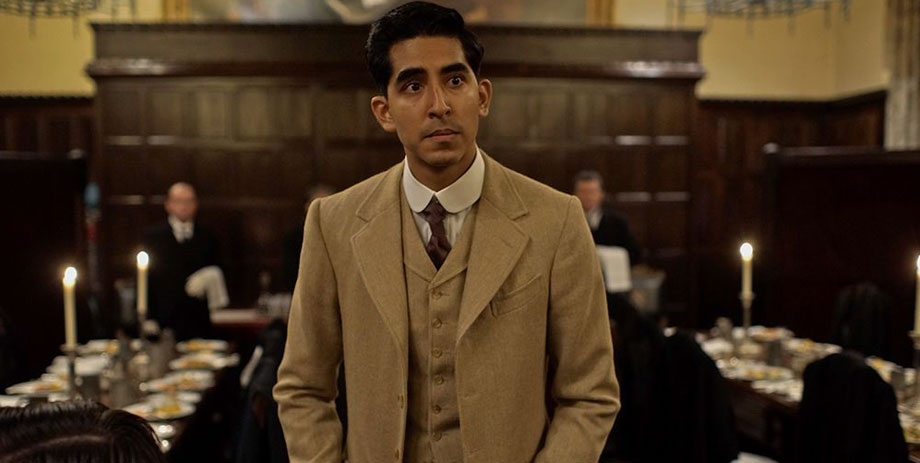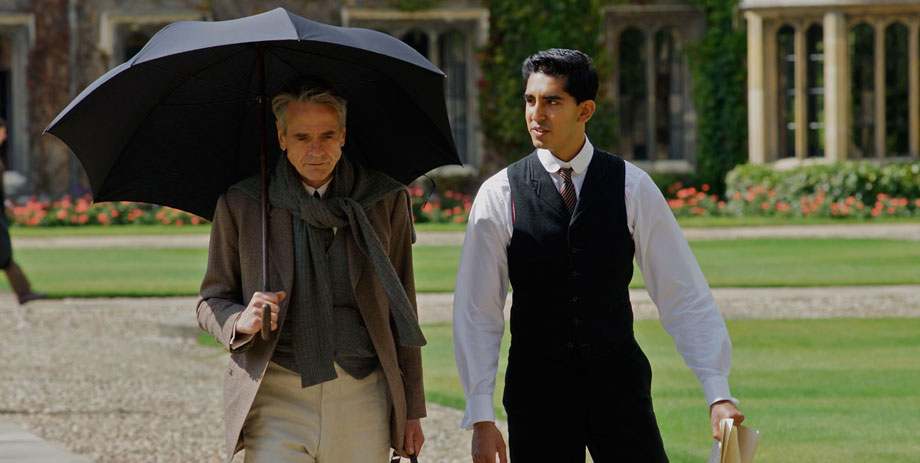The Man Who Knew Infinity
The Man Who Knew Infinity
Matthew Brown, director & script
Starring: Dev Patel (Srinivas Ramanujan), Jeremy Irons (G.H. Hardy), Toby Jones (John Littlewood), Stephen Fry (Sir Francis Spring), Jeremy Northam (Bertrand Russell), Kevin McNally (Major MacMahon), Devika Bhise (Janaki), Arundhati Nag (Ramanujan’s mother)
This is the age of films about mathematics. Think back over the past 20 years and you’ll likely recall with some fondness The Infinity Game, Good Will Hunting, Proof, A Beautiful Mind, Pi, Money Ball and probably a few others like I.Q. with the late great Walter Matthau as Einstein or the Canadian sci-fi brain puzzler Cube. But if you go back to Hollywood’s Golden Age and try to recall a math movie, you’ll soon realise that there’s nary a one. I think it’s the rise of personal computers that made math accessible and interesting to the masses. At any rate, you can now raise significant numbers to produce them.
A truism among advocates of documentaries is that truth is stranger than fiction. Certainly that’s the case with the tale of Srinivas Ramanujan, a poor Tamil Hindu Brahmin, who dropped out of two colleges in India, but is now recognised as one of the greatest mathematics geniuses of all time. A complete original, he made important contributions to number theory, continued fractions and mathematical analysis. His journals, which offer over 3900 proofs of his theories are still being studied as if they’re holy texts and his ideas are now being applied to equations surrounding the properties of black holes.

Ramanujan was a great enigma. A quiet, passionate Indian living during the height of the British Empire—his birth and death numbers are 1887-1920—he might have remained unrecognised if not for G.H. Hardy, a Cambridge professor, who responded to a letter from Ramanujan in 1913. In it, Ramanujan offered a wealth of formulations, most of which flummoxed the British mathematician. Impressed, Hardy arranged for Ramanujan to come to England, where the two formed a brilliant partnership for five years, only ending when the Great War (WW1) concluded in late 1918.
The Man Who Knew Infinity tells this remarkable tale quite well. Dev Patel, now familiar to international audiences thanks to Slumdog Millionaire and the Best Exotic Marigold Hotel series, is well cast as Ramanujan and the fine British character actor Toby Jones adds charm as Hardy’s math colleague Littlewood. But despite the title, this film belongs not to Ramanujan but to Hardy. Jeremy Irons seems to have been born to play the role of the British eccentric, who fought the Empire’s prejudice against Indians in order to work on pure mathematics with Ramanujan.

Wearing owlish glasses and full professorial regalia, Iron’s Hardy is clearly one of those Brits who dedicated his life to work in a style befitting a monk. He called his relationship with Ramanujan “the only romantic incident in his life.” Not that their relationship was sexual; of course, it wasn’t. We might now call a man like Hardy a repressed homosexual or perhaps a progressive autistic. Then, as now in England, he was accepted as an eccentric and that’s how Irons plays him.
A genuine figure of Romance in his youth, Jeremy Irons can still dominate a production and absolutely sway the emotions of a scene through his presence even in his (somewhat) advanced years. The possessor of one of the finest dramatic voices in contemporary England, Irons makes a famous Hardy aphorism breathe again in the film. At one point in The Man Who Knew Infinity (and in real life), Hardy said to his great friend the philosopher Bertrand Russell, “If I could prove by logic that you would die in five minutes, I should be sorry you were going to die, but my sorrow would be very much mitigated by pleasure in the proof.” Irons delivers those lines with the slightly muted elegance of one of this world’s finest thespians.

Perhaps because of the esoteric nature of the film, neophyte director and scriptwriter Matthew Brown has tried unsuccessfully to make The Man Who Knew Infinity more accessible. There are scenes of violent prejudice against Ramanujan, which could well have happened to any Indian during the War but are treated quite melodramatically. Overly romanticized, too, is the relationship between Ramanujan and his wife, who was stuck in India, with the math genius’ mother. Throughout there’s a tendency to make the Hardy/Ramanujan friendship into a “bromance,” with requisite expressions of emotions, which are unlikely to have occurred to the real mathematicians.
Canards aside, The Man Who Knew Infinity is a wonderful story told with little compromise. It’s definitely worth seeing—and, who knows?, perhaps Irons will garner an Oscar nomination for his depiction of Hardy.
Written by Marc Glassman
Adjunct Professor, Ryerson University
Director, Pages UnBound: the festival and series
Editor, POV Magazine
Editor, Montage Magazine
Film Critic, The New Classical FM
Film programmer, Planet in Focus
Tune in to hear Marc Glassman’s Art Reviews
Friday’s at 9:07am on Good Day GTA.











